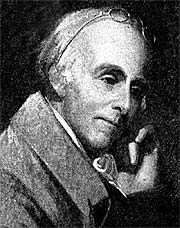Benjamin Rush
 |
| Benjamin Rush, America's leading doctor at the time Meriwether Lewis visited him for advice about the upcoming expedition. Image © 2002 www.clipart.com. |
Benjamin Rush no doubt was America's leading physician when Meriwether Lewis visited him; he had made his mark during the American Revolution.
Born and raised in Pennsylvania, Rush completed his medical training in 1768 in Edinburgh, Scotland. He also studied medicine in England and Paris. In 1769 he settled in Philadelphia and was elected professor of chemistry in the city medical college.
Early on he began to write about the need for colonial rights. He published essays on the abolition of slavery and capital punishment, temperance, health, education for women, tobacco, and patriotism. He even supplied the title to Common Sense, his friend Thomas Paine's famous paper promoting American independence. He eventually was a delegate to the Continental Congress and became a signer of the Declaration of Independence.
During the Revolutionary War he was physician general of the Revolutionary Army. He treated the wounded in the battles of Trenton, Princeton, the Brandywine, and Germantown. He also served the sick at Valley Forge. In 1778 he resigned his military office in protest of the treatment of soldiers in hospitals and refused any compensation for his military service, though he had no income at the time.
He returned to Philadelphia, established his practice, and continued as professor at the medical college. He was a founder of Dickinson College and was active in creating public schools.
During the 1793 yellow fever epidemic, he saw more than 100 patients a day and his account of the outbreak won him international recognition. While he promoted sanitation and quarantine to prevent the spread of disease, he also believed in bloodletting and purging for treatment. That approach brought enemies. One paper, Peter Porcupine's Gazette, was so violent in its attacks that it was prosecuted. Rush was awarded $85,000 by a jury. He distributed the money among the poor.
His lasting medical legacy is his work with the mentally ill at Pennsylvania Hospital. He believed in humane treatment of the insane. He published the first American psychiatric textbook in 1812. He is known today as the "father of American psychiatry."
Among various other positions he served was as treasurer of the U.S. Mint, which he held from his appointment in 1797 to his death in 1813.
Lewis' short visit with Rush illustrated the doctor's inquisitive approach. Rush peppered the young explorer with a list of questions to consider when meeting Indian tribes.
Ironically, Rush met his death through another epidemic, typhus.
< previous | next > | 


